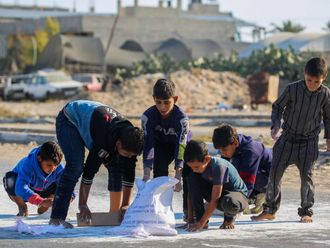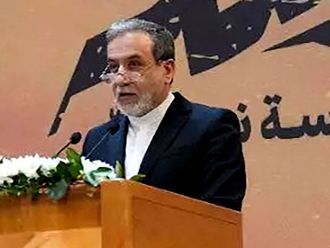Baghdad: The spiritual leader of Iraq’s Shiite majority called for a new, “effective” government on Friday, increasing pressure on the country’s prime minister as an offensive by Sunni militants rages on.
Grand Ayatollah Ali Al Sistani’s comments at Friday prayers contained thinly veiled criticism that Shiite Prime Minister Nouri Al Maliki, in office since 2006, was to blame for the nation’s crisis over the blitz by the Al Qaida-inspired Islamic State of Iraq and the Levant (Isil).
While Al Maliki’s State of Law bloc won the most seats in parliament in the Iraq’s April 30 election, he now faces opponents bolstered by criticism Thursday from US President Barack Obama.
And with Iraq now asking the US for air strikes to temper the militants’ advance, especially as they apparently prepared on Friday to again assault the country’s biggest oil refinery, Al Maliki appears increasingly vulnerable.
“It is necessary for the winning political blocs to start a dialogue that yields an effective government that enjoys broad national support, avoids past mistakes and opens new horizons toward a better future for all Iraqis,” Al Sisanti said in a message delivered by his representative Ahmad Al Safi in the holy city of Karbala.
The Iranian-born Al Sistani, who is believed to be 86, lives in the holy city of Najaf south of Baghdad. A recluse, he rarely ventures out of his home and does not give interviews. Iraq’s Shiites deeply revere him and a call to arms he made last week prompted thousands of Shiites to volunteer to fight against the Islamic State.
Al Maliki’s Shiite-led government long has faced criticism of discriminating against Iraq’s Sunni and Kurdish populations. But it is his perceived marginalisation of the once-dominant Sunnis that sparked recent violence reminiscent of Iraq’s darkest years of sectarian warfare after the 2003 US-led invasion.
Iraq’s newly elected parliament must meet by June 30 to elect a speaker and a new president, who in turn will ask the leader of the largest bloc to form a new government.
With Iraq in turmoil, Al Maliki’s rivals have mounted a campaign to force him out of office, with some angling for support from Western backers and regional heavyweights. On Thursday, their effort received a massive boost from Obama, who said: “Only leaders that can govern with an inclusive agenda are going to be able to truly bring the Iraqi people together and help them through this crisis.”
“We’ve said publicly, that whether [Al Maliki] is prime minister or any other leader aspires to lead the country, that there has to be an agenda in which Sunni, Shiite and Kurd all feel that they have the opportunity to advance their interest through the political process,” the president said.
An “inclusive agenda” has not been high on the priorities of Al Maliki, however. Many of Al Maliki’s former Kurdish and Shiite allies have been clamoring to deny the prime minister a third term in office, charging that he has excluded them from a narrow decision-making circle of close confidants.
Al Maliki’s efforts last year to crush protests by Sunnis complaining of discrimination under his Shiite-led government sparked a new wave of violence by militants, who took over the city of Fallujah in the western, Sunni-dominated province of Anbar and parts of the provincial capital, Ramadi. Iraqi army and police forces battling them for months have been unable to take most areas back.
At the same time, many Iraqis complain of government corruption, the failure to rebuild the economy and too close ties with mostly Shiite Iran.
Al Maliki’s troubles come as militants and soldiers fight for control of the Beiji refinery, the country’s largest, some 250km north of Baghdad. The loss of the refinery would be a devastating symbol of the Baghdad government’s powerlessness in the face of a determined insurgency hostile to the West. By late Thursday, the two sides held different parts of the refinery, which extends over several square kilometers of desert.
The army officer in charge of protecting the refinery told The Associated Press on Friday that he believed the militants were regrouping to launch a new attack after his forces repelled one Thursday night. There was no immediate way to independently verify his claims.
The facility’s production accounts for just over a quarter of the country’s entire refining capacity. It goes strictly toward domestic consumption for gasoline as well as fuel for cooking and power stations.
It isn’t clear what the insurgents would do if they fully captured Beiji. In Syria, the Islamic State has control of some smaller oil fields, but government air raids have limited their ability to profit from them. Militants have, however, refined oil into usable fuel products at primitive refineries.












